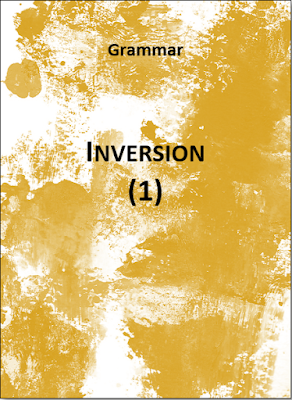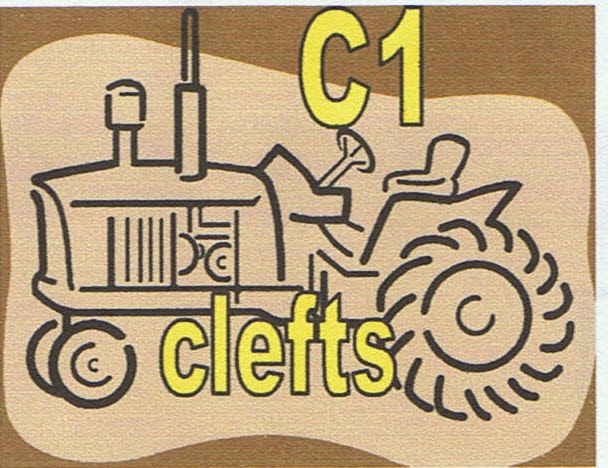INVERSION
What
is inversion?
Basically it is changing the
order subject-verb as we do in questions (Can
I leave, please?) but it’s not a question and it is used to emphasize.
Consider the following examples:
1. They are made to one another, you know; both
right on the same wavelength, and both of course love high voltage tourism. On
their last journey, not
only did they visit Syria and Yemen but Afghanistan as well.
2. She lacks taste, you know. A bit tacky,
everything she buys. Never
have I seen her wearing a decent dress
together with decent shoes.
3. He was in such a hurry; believe me, he didn’t
know what he was doing: swallowed two biscuits, gulped a cup of tea, and no sooner had he brushed his teeth than he jumped through the front window forgetting he was
not at his mother’s cottage but at his girlfriend’s, on a seventh floor. Thank
God in a jiffy arrived an ambulance
[fronting, compare].
4. As you all know here, I love juicy meat on
the grill, just with a bit of salt. Well, last week my wife and I found this
little place in Torrox. And, let me tell you, seldom in my life have I eaten such good meat.
·
Notice
that all three examples given (and in class as well) have negative elements;
·
Notice also that the negative element is at
the beginning of the sentence;
·
Notice
that what has been done here is to bring the negative elements from middle or
end position to front position in the sentence (not only, never, no sooner), and these drag the verbs,
which implies a change in the order S+V → V+S.
·
Notice that if the verb is not an auxiliary
verb (have, for instance), you will
need to introduce one and it is here that do/does/did
come in in accordance to person and time reference.
·
Notice
that, in a way, “inversions” are like “questions” (actually, “questions” are a type of “inversion”) but since
they have an extra element (negation) instead of asking they declare, and
they do in a very strong way.
·
Notice, finally, that the negative element is
not always clearly negative. Other elements can be used, such as
seldom rarely hardly hardly ever only
Front position doesn’t mean that the negative elements will have to be right at the
beginning of the sentence. In example 1, the negative element comes after a
time adverbial that has been placed there but could be at the end; in example 3
the negative element follows the coordinator “and”; only in number 2 is the negative element in first
position [this last, by the way, is another case of inversion because only has been placed in front position and
it has dragged the verb before the subject]
Look at the following:
Example A
No inversion He doesn’t only linger in this
street all day but he even sleeps under that tree at night.
Inversion Not only does he linger in this street all day but he
even sleeps under that tree at night.
Example B
No inversion Smith & Co will never
come to terms with us.
Inversion Never will Smith & Co come to terms with us.
Example C
No inversion He had
no sooner left than the guests let out a cheer.
Inversion No sooner had
he left than the guests let out a cheer.
More
examples
a) Not until 10pm did they realize they had
forgotten little Johnny at the cinema.
b) Not until they had arrived home did they
realize they had forgotten the little Johnny at the cinema.
note that “they had arrived home” is not inverted; this is so because it is
not the main clause, the main clause being “they realized they had.....
c) Under no circumstance
will they sign this contract.
d) Not before dawn do
they go back home
e) Only after an eleven
months’ holiday can one feel ready to go back to work.
f) Never in all his
vagabond life has Peter Shrunk bought a packet of cigarettes (Shrunk is alive).
g) Never in all his
vagabond life did Peter Shrunk buy a packet of cigarettes (Shrunk is dead).
h) Hardly ever has she
come here with a smile on her face.
Saying them aloud, without
writing a word, try to transform the following sentences into inversions; try
to record yourself. After each one, check the answer in the key below and
repeat it several times aloud. The idea is that you learn them orally.
1.
He has never been to one of those street
markets full of fleas and flies.
2.
He seldom comes round.
3.
She had no sooner arrived than he flew into a
rage [become very angry].
4.
Mr Monroe had hardly ever been to such a
distinguished place.
5.
He wouldn’t do it for the world.
6.
She didn’t open the present until he had
left.
7.
He rarely goes out on Saturdays.
8.
He wouldn’t do it on any account. [Note: “any” becomes “no”]
9.
You will barely recognize him after such a long
time.
10.
The throng of admirers had scarcely scattered
when she arrived.
1.
Never has he been to one of those street
markets full of fleas and flies.
2.
Seldom does he come round.
3.
No sooner had she arrived than he flew into a
rage.
4.
Hardly ever had Mr Monroe been to such a
distinguished place.
5.
Not for the world would he do it.
6.
Not until he had left did she open the
present. (If doubts, look at “More examples – b - Note”)
7.
Rarely does he go out on Saturdays.
8.
On no account would he do it.
9.
Barely will you recognize him after such a
long time.
10.
Scarcely had the throng of admirers scattered
when she arrived.










Comentarios
Publicar un comentario